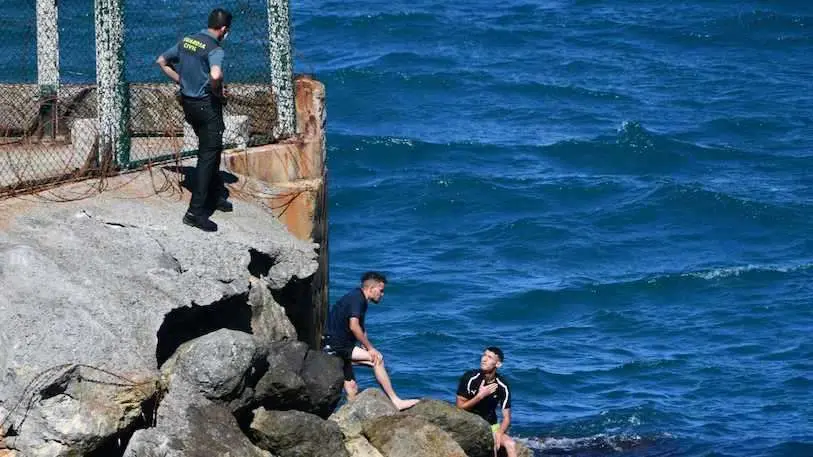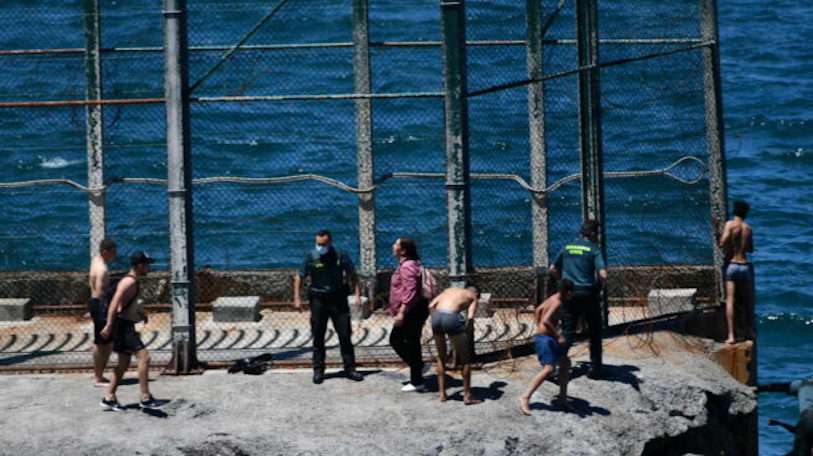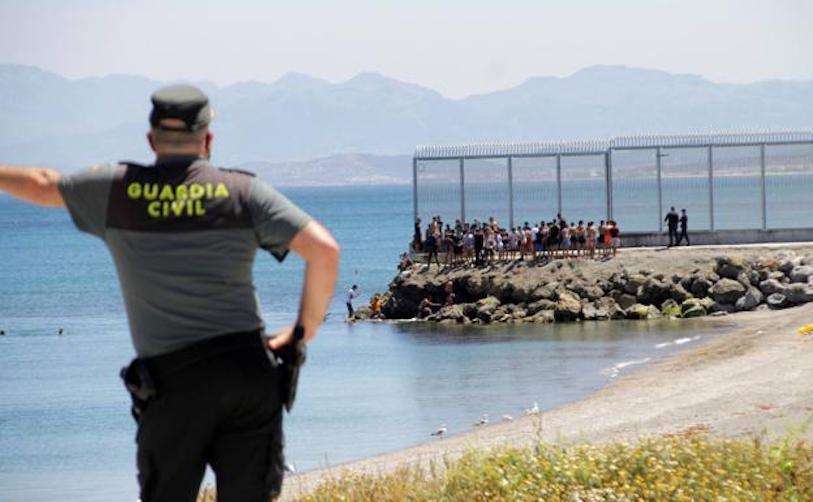Miles de migrantes se dirigen a Ceuta desde Marruecos

Hundreds of people are still heading, in an unstoppable wave that has lasted all day Monday and continues during the early hours of this morning, from the town of Fnideq (Castillejos) to cross to Ceuta, in an unprecedented flood of immigrants in Spain to register the entry in 24 hours of 5,000 people (a third of them minors) in the Spanish city bordering Morocco.
Entire families with children, young people, but above all many unaccompanied minors, as well as a smaller number of sub-Saharans, all headed without hesitation towards the border with Ceuta with the aim of crossing to the Spanish side in the face of the apparent indifference and scant control of the Moroccan security forces.
Many vehicles parked in the perimeter near the border post, while an endless queue of people formed along the coast between Castillejos and Ceuta and managed to cross the breakwater separating the two cities, some swimming and others walking.
The road leading to the Ceuta border post on the Moroccan side had been closed for more than a year with security barriers to any movement of people or vehicles since the closure of the land border in March 2020 as a result of the coronavirus health crisis.
Several would-be emigrants to Ceuta told Efe that the flood of migrants began last night when rumors spread among citizens about the withdrawal of the deployment of law enforcement around the border post from the Moroccan side, which is known on this side as Bab Sebta (the Gate of Ceuta).

This has produced a call effect and since this Sunday people did not stop arriving in Castillejos, where the movement has not stopped even at night, despite the curfew imposed in the country as prevention against the coronavirus.
In Castillejos, a young man was shouting to a group of friends stationed at the border, apparently closed on the Moroccan side: "Don't go, I have been told that they will reopen it at 3 or 4 in the morning and you will be able to pass", he advised them.
Another neighbor of Castillejos tells: "A relative of mine, a teenager, as soon as he got the information he came from Fez (5 hours away), and now he has already managed to enter Ceuta".
And a woman from the same village reports that her 15 year old son entered Ceuta as if he were committing a prank, accompanied by his friends. "As soon as my neighbors told me, I ran to the beach in Ceuta to look for my son," the mother told Efe while pointing to her wet djellaba and her feet full of sand. The border had not existed for her.

Most of those who have been able to cross easily to Ceuta were Moroccans, as Efe could see on the spot, and to a lesser extent sub-Saharan Africans.
At one point around 22.30 local time (one more in Spain) there was a moderate deployment of police and law enforcement to try to keep the thousands of people gathered at the site away from the main road, although this did not stop the attempts to cross to the Spanish side.
The president of the Northern Observatory for Human Rights, Mohamed Benaissa, who says he has never seen anything like this "in his whole life", believes that the current avalanche of migrants is "a pressure card used by Morocco against Spain" because of the current diplomatic crisis between the two countries following the hospitalization in Logroño of the leader of the Polisario Front, Brahim Ghali.
But Benaissa also points out that this massive emigration is the result of the desperation of the young people of this northern region that is experiencing a crisis after the closure of the land border, the abrupt end of smuggling of goods (main source of livelihood for decades) and the lack of economic alternatives, which has caused street protests in recent months.
The Spanish government has sent 200 additional agents to Ceuta (150 policemen and 50 civil guards) to reinforce border control, in addition to specific personnel from the Scientific Police and the Foreigners and Borders Police to speed up the return procedures in application of the 1992 agreement with Morocco, although this agreement has been applied in the past only in dribs and drabs.

The Moroccan authorities are silent in the face of the avalanche of some 2,700 migrants arriving in Ceuta by swimming or on foot since the early hours of Monday morning, a phenomenon never seen before in this Spanish autonomous city, whose border with Morocco has been closed since March 2020.
Contacted by Efe, neither the Ministry of the Interior nor the Ministry of Foreign Affairs made a statement on the reasons for this massive arrival of immigrants, among which there are approximately 700 minors, and this when the country's media are profusely collecting the information coming from Spain.
A local journalist told Efe that "it is something never seen before, they come from all over the region, from Castillejos, from Rincón, from Tetuán. And they enter without any control, neither on the Moroccan nor on the Spanish side," he said, before adding that the entries are occurring through the two border points of Ceuta, the west (Beliunes) and the south (Castillejos).
As night was falling, and despite the curfew in force throughout the country, the journalist specified that "they continue to arrive and cross the border".
The vast majority are Moroccans, but also among the sub-Saharan migrant communities "spread the word" that the Moroccans had stopped guarding the beaches and the border with Ceuta, so also among them there was a "call effect", sources from migrant aid organizations told Efe.
These sources explained that it was the state of the sea that prevented the Strait of Gibraltar from filling up with small boats and that the sub-Saharans preferred to enter Ceuta with their rowing boats.
Sources of the Spanish Government Delegation in Ceuta have told Efe that this data shows that it has been one of the most critical and unprecedented migratory days that Ceuta has faced in recent years.
At 8.30 pm an urgent meeting of the Coordination Center (CECOR) has been called, in which representatives of the Government Delegation and the Ceuta Executive will participate to analyze the situation.
Throughout 2021 there have been registered entries by swimming from the neighboring country, the most recent on April 27th, although for 15 years there had not been a massive arrival like this in a single day, and in the absence of coastal surveillance by the Moroccan authorities, as Efe has been able to verify.

The Minister of Foreign Affairs, Arancha Gonzalez Laya, said Monday that she is not aware that what happened could be a measure of pressure from Morocco for the presence of the leader of the Polisario Front, Brahim Ghali, in a Spanish hospital.
"No, we are not aware of it," was the terse response of the minister upon her arrival at an event of the Organization of Ibero-American States (OEI). Minister Gonzalez-Laya advanced that the Government has already put the means to secure the borders of the autonomous city and to return to Morocco the people who have entered illegally "following the protocols in force", as, she added, has already been done this afternoon with about a hundred migrants.
The migratory avalanche registered in Ceuta throughout this Monday, which has totaled 5,000 people since last night, according to the Government Delegation in Ceuta, has no precedent in Spain even in the most critical years of the migratory crises registered in the Canary Islands or in the Strait of Gibraltar, according to data collected by Efe.
The previous record had been reached in November last year, when in a single weekend 2,188 migrants arrived on the coasts of the Canary Islands aboard 58 small boats or cayucos; of these, 1,461 arrived in a single day, the latter figure that has been practically doubled today.
Neither in 2018, a year that represented a "migratory peak" with 57,500 irregular entries throughout the national territory, was that figure reached in a single day, nor in 2006, in the so-called "cayuco crisis", which brought 32,000 migrants to the Canary Islands.

As far as the Canary Islands were concerned, the small boats and canoes came not only from Western Sahara, controlled by Morocco, but also from Mauritania and even Senegal.
Another critical moment was experienced in August 2014: in the single day of the 12th, 920 people arrived on the coasts of southern Spain, coming from those of Tangier and aboard 94 small boats, taking advantage of the fact that on that day there were "certain dysfunctions", as the Moroccan Minister of the Interior, Mohamed Hasad, then said, and which resulted in the disappearance of the surveillance of Moroccan agents from their coasts.
Those "dysfunctions" were due, as Spanish diplomatic sources acknowledged at the time, to the anger caused to King Mohamed VI by the encounter he had had with a Spanish Civil Guard boat in the waters near Ceuta the day before; apparently, a Spanish agent demanded the king to identify himself for his presence on board a nautical motorboat in Ceuta waters, which angered the monarch.
In the case of today's migratory avalanche, there are still no official explanations from the Spanish or Moroccan side: several sources in Rabat and Madrid attribute what happened to the current moment of crisis between the two countries due to the hospitalization of the Polisario Front leader, Brahim Ghali, in the city of Logroño, but the Spanish Minister of Foreign Affairs, Arancha González-Laya, declared on the matter: "I am not aware of it".
The Spanish government has limited itself to announcing the dispatch of 200 agents of the Police and the Civil Guard to reinforce the border control in Ceuta, without asking for explanations from Morocco, while the Moroccan government has maintained absolute silence during the whole day.









